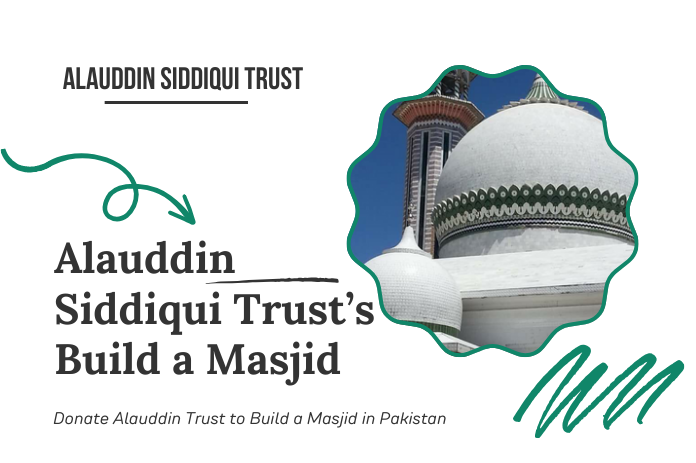Introduction
A masjid, or mosque, holds a special place in the hearts of Muslims worldwide. It is not just a place of worship but a center for community, education, and social welfare. The role of a masjid extends far beyond the five daily prayers; it becomes a beacon of hope, a sanctuary of peace, and a hub of activity for the community it serves. Recognizing the profound impact that a masjid can have on a community, the Alauddin Siddiqui Trust has dedicated itself to building masjids in underserved areas, transforming lives and empowering communities.
The Significance of a Masjid in a Community
A masjid is often the cornerstone of a Muslim community. It provides a space where individuals can come together to pray, learn, and support one another. The communal prayers held in a masjid foster a sense of unity and brotherhood, reminding Muslims of their shared faith and responsibilities towards one another.
In addition to being a place of worship, a masjid often serves as an educational center. It is where children and adults alike can learn about Islamic teachings, Quranic studies, and moral values. Many masjids offer classes and lectures that help to deepen the understanding of Islam and encourage personal and spiritual growth.
The Alauddin Siddiqui Trust: A Vision of Empowerment
The Alauddin Siddiqui Trust was established with the vision of uplifting and empowering communities through various initiatives, one of the most significant being the construction of masjids. The Trust understands that Building A Masjid is not just about constructing a physical structure; it is about creating a space that fosters spiritual growth, social cohesion, and community development.
The Trust has identified areas where access to a masjid is limited or non-existent. These are often regions where communities are marginalized, and the lack of a masjid means the absence of a central place for worship, education, and social support. By building masjids in these areas, the Alauddin Siddiqui Trust is addressing a critical need and helping to uplift these communities.
Building a Masjid: A Transformative Process
The process of building a masjid is transformative, not just for the community that benefits from it but also for those involved in its construction. The Alauddin Siddiqui Trust approaches each project with care, ensuring that the masjid meets the needs of the local community and is built to last for generations.
1. Identifying the Need
The first step in building a masjid is identifying where it is most needed. The Trust conducts thorough assessments to determine which communities are most in need of a masjid. This involves understanding the local population, their access to existing facilities, and the challenges they face in practicing their faith.
2. Community Involvement
Building a masjid is a community effort. The Alauddin Siddiqui Trust ensures that local communities are involved in every step of the process, from planning to construction. This involvement fosters a sense of ownership and responsibility among community members, ensuring that the masjid is not just a building but a cherished part of their lives.
3. Sustainable Construction
The Trust is committed to sustainable construction practices. This means using local materials where possible, employing local labor, and ensuring that the design of the masjid is environmentally friendly. The goal is to build a masjid that is not only beautiful and functional but also in harmony with its surroundings.
4. Education and Outreach
Once the masjid is built, the Alauddin Siddiqui Trust works to ensure that it serves as a center for education and outreach. This includes setting up classes, lectures, and programs that benefit the entire community. The masjid becomes a place where people can come to learn, grow, and connect with others.
The Impact of Building a Masjid
The impact of building a masjid extends far beyond the immediate community. It has a ripple effect that can transform entire regions. Here are some of the key ways in which building a masjid can empower communities:
1. Spiritual Growth
A masjid provides a space for spiritual growth and development. It is where Muslims can connect with their Creator, seek guidance, and find peace. Regular attendance at the masjid helps to strengthen faith, build discipline, and cultivate a deeper understanding of Islamic teachings.
2. Social Cohesion
Building a masjid brings people together. It creates a sense of unity and belonging among community members, regardless of their backgrounds or socioeconomic status. The masjid becomes a place where people can come together to pray, celebrate, and support one another.
3. Educational Opportunities
A masjid often serves as a center for education. It provides opportunities for children and adults to learn about their faith, acquire new skills, and gain knowledge that can help them in their daily lives. The educational programs offered at a masjid can have a lasting impact on individuals and families, helping to break the cycle of poverty and ignorance.
4. Charitable Activities
Charity is a fundamental aspect of Islam, and a masjid often serves as a hub for charitable activities. Building a masjid in a community means establishing a place where zakat (charity) can be collected and distributed to those in need. This not only helps to alleviate poverty but also strengthens the bonds of brotherhood and solidarity within the community.
5. Economic Development
The construction of a masjid can also have economic benefits for the community. The process of building a masjid often involves local labor and materials, providing employment opportunities and stimulating the local economy. Once the masjid is built, it can attract visitors and pilgrims, further boosting the local economy.
How You Can Help: Support the Alauddin Siddiqui Trust in Building a Masjid
The work of the Alauddin Siddiqui Trust is made possible by the generous support of donors and volunteers. Building a masjid is a collective effort, and there are many ways you can get involved and make a difference.
1. Donate
Your donations can help fund the construction of a masjid in a community that desperately needs it. Every contribution, no matter how small, can have a significant impact. The Alauddin Siddiqui Trust ensures that all donations are used efficiently and effectively, with full transparency and accountability.
2. Volunteer
If you have skills in construction, education, or social services, consider volunteering your time and expertise. The Trust welcomes volunteers who are passionate about making a difference and are willing to contribute their talents to the cause.
3. Spread the Word
Help raise awareness about the importance of building a masjid and the work of the Alauddin Siddiqui Trust. Share information about their projects with your friends, family, and social networks. The more people who know about this cause, the more support the Trust can garner.
Conclusion
Building a masjid is more than just constructing a physical structure; it is about creating a foundation for spiritual growth, social unity, and community development. The Alauddin Siddiqui Trust’s commitment to building masjids in underserved areas is a testament to their dedication to empowering communities and transforming lives. Through their efforts, these masjids become more than just places of worship—they become centers of education, charity, and hope. By supporting the Alauddin Siddiqui Trust in their mission, you are not only helping to build a masjid but also contributing to the upliftment of entire communities. Together, we can create spaces that foster faith, nurture growth, and empower individuals to build a brighter future.
Also Read: Al-Wahab Foundation: Serving Humanity in the UK



